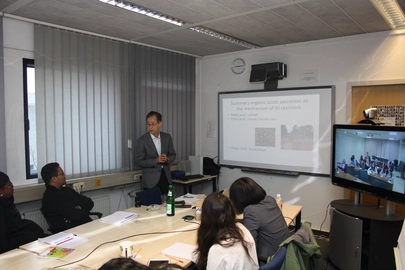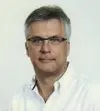Cooperation between ZEF and IPADS moves forward. Interview with Professor Kensuke Okada during his visit to ZEF.
January 22, 2016.
January 22, 2016. The "collaborative education" between the International Program in Agricultural Development Studies (IPADS) at the University of Tokyo in Japan and ZEF has moved forward to a next step by a working visit of Professor Kensuke Okada to ZEF over the past week.
Professor Okada has been teaching a one-week course in Plant and soil management to a group of around ten ZEF doctoral students plus a group of IPADS students in Japan who were connected to the course-room per video call.
"In the beginning the students were very quiet, but in the course of the week the teaching became lively and inspiring, and the two groups of students interacted in a very cooperative and fruitful way", Professor Okada said in an interview (read the full interview below). "The groups were both very heterogeneous in terms of academic and geographic background, which made it an inspiring experience".
Read more about the cooperation <link http: www.zef.de external-link-new-window external link in new>here.
·
The cooperation between ZEF and IPADS has been running for about a year now. What have been the main developments and achievements so far in your opinion?
· Our senior scientist and IPADS coordinator Dr. Taro Takahashi visited ZEF around one year ago and started the cooperation. I am very happy about the exchange of scientific staff and the soon to be signed Memorandum of Understanding between the Universities of Bonn and Tokyo. This is a significant accomplishment for a basically one-year collaboration compared to other collaborations we run. We owe a lot to Dr. Taro Takahashi, he really worked very hard to get these things done. For the upcoming year we plan reciprocal visits of students and professors and we think about organizing a joint symposium as a kind of kick-off event for further development. We are also striving to involve some other university departments at our university in Tokyo. IPADS is part of the Department of Global Agricultural Sciences but we want to reach out to the medical and social sciences departments too, to make this cooperation really interdisciplinary. So there are a lot of things to do this year.
· Is IPADS a kind of flagship program for the University of Tokyo?
· Well, study programs in English, attracting international students and boosting international cooperation, are part of the University’s internationalization strategy. Within the Graduate School of Agricultural and Life Sciences we are the only international program, but, of course other faculties have such programs too. We just have achieved a lot in very short notice and attracted many students from all over the world, coming from Indonesia, Taiwan, China, Bangladesh, Sri Lanka, India, Pakistan, Mexico, Colombia, Bolivia, U.S.A.
· One crucial part of the collaborative education program is teaching. You have been teaching doctoral students here at ZEF on the topic of “Soil fertility management” over the past week. The course room was video-connected with the IPADS students in Japan. What were your impressions of this week?
· I really enjoyed this experience for the past five days. In the beginning, the students were rather quiet, but in the course of the week the teaching became lively and inspiring, and the two groups of students interacted in a very cooperative and fruitful way. From the IPADS side, we had more students than expected. The groups were both very heterogeneous in terms of academic and geographic background. This made my task of knowledge transfer about the details of soil and crop nutrition not an easy one to accomplish, but it certainly was an inspiring experience. I think we will get used to this kind of teaching.
· So what are the next steps of the collaborative education effort between ZEF and IPADS and what are your personal expectations of it?
· Well, this year we are going to invite Professor Christian Borgemeister to Japan and we want to have a workshop or symposium to reach not only the agriculture or ecology professors who are involved but also to integrate other departments and graduate schools of the University of Tokyo. From a long-term perspective we have started the collaboration on education, but we want to expand it to research. So we started talking about acquiring external funds also from international agencies. We are also thinking and negotiating about a joined university degree, but we will still have to go through a long process on both sides before this is being finalized and recognized.
Professor Okada, we thank you for this interview.
The interview was conducted by Alma van der Veen



